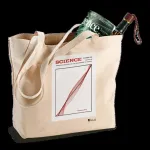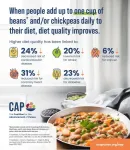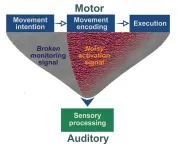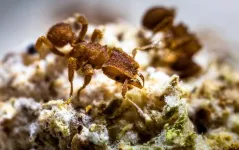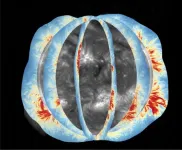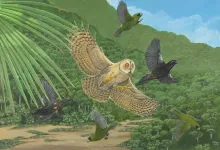Three beer-related discoveries to celebrate Oktoberfest
2024-10-03
(Press-News.org) Frothy or smooth, bitter or sweet, light or dark: There’s a beer for most palates. As people around the world pour over the best brews at Oktoberfest celebrations or ferment about their favorite fall-themed beers, three papers published in ACS journals crack open new insights into these beverages. And if you’re hop-ing to conduct studies to find which beer is good for what ales you, please drink responsibly. Reporters can request free access to these papers by emailing newsroom@acs.org.
Coriander’s origin changes beer flavor. Just like simmering a stew, brewing a beer with herbs and spices can enhance its flavor. A study in ACS Food Science & Technology reports that coriander seeds harvested from different countries (Bulgaria, Canada, Morocco and India) impart varying amounts of sweet, herbal and/or cooling flavors in Belgian white beers. The research group found that adding three compounds specific to Bulgarian coriander seeds could also enhance flowery characteristics in a model beer they created.
Barley proteins impact hop bitterness. Researchers in ACS’ Journal of Agricultural and Food Chemistry explored how malt from two different barley cultivars interacted with hop extracts during the wort-boiling stage of the brewing process. They found that wort prepared from the higher-protein barley malt had lower acid levels, which suggests the proteins trap and remove some of the bitter-tasting hop compounds that influence the beer’s final flavor. The researchers say these results could help brewers tailor the taste of their suds; for example, they could select low-protein barley for a hoppy beer.
Testing microbes for a probiotic beer. Functional beverages, such as prebiotic sodas, kombucha and fermented dairy drinks, are popular right now. To create a probiotic beer, researchers screened several different lactic acid-producing bacterial strains. Their comprehensive brewing experiments published in ACS Food Science & Technology demonstrated that five of the 21 strains tested could reach cellular counts associated with probiotic activity. But these counts were only reached in lightly hopped beers (below 2 international bitterness units (IBUs), a level that’s insufficient to give beer its signature bitterness). The next step for the researchers is testing the viability of the probiotic bacteria after carbonation, storage and consumption.
###
The American Chemical Society (ACS) is a nonprofit organization chartered by the U.S. Congress. ACS’ mission is to advance the broader chemistry enterprise and its practitioners for the benefit of Earth and all its people. The Society is a global leader in promoting excellence in science education and providing access to chemistry-related information and research through its multiple research solutions, peer-reviewed journals, scientific conferences, e-books and weekly news periodical Chemical & Engineering News. ACS journals are among the most cited, most trusted and most read within the scientific literature; however, ACS itself does not conduct chemical research. As a leader in scientific information solutions, its CAS division partners with global innovators to accelerate breakthroughs by curating, connecting and analyzing the world’s scientific knowledge. ACS’ main offices are in Washington, D.C., and Columbus, Ohio.
Registered journalists can subscribe to the ACS journalist news portal on EurekAlert! to access embargoed and public science press releases. For media inquiries, contact newsroom@acs.org.
Note: ACS does not conduct research but publishes and publicizes peer-reviewed scientific studies.
Follow us: X, formerly Twitter | Facebook | LinkedIn | Instagram
END
ELSE PRESS RELEASES FROM THIS DATE:
2024-10-03
Washington, D.C. — The American Association for the Advancement of Science, one of the world’s largest general scientific societies and publisher of the Science family of journals, announces an external research project to help the organization reimagine AAAS.org as part of a website overhaul project, which recently kicked off. AAAS is seeking input from its key audiences, including reporters and public information officers, to better align the experience and content of the website. As AAAS embarks on the next ...
2024-10-03
Looking deep into the early universe with NASA’s James Webb Space Telescope, astronomers have found something unprecedented: a galaxy with an odd light signature, which they attribute to its gas outshining its stars. Found approximately one billion years after the big bang, galaxy GS-NDG-9422 (9422) may be a missing-link phase of galactic evolution between the universe’s first stars and familiar, well-established galaxies.
“My first thought in looking at the galaxy’s spectrum was, ‘that’s weird,’ which is ...
2024-10-03
Moscow, Idaho, October 3, 2024: New research showing the association between greater bean and pulse consumption and improved shortfall nutrient intakes and a higher diet quality in American adults will be presented during the Academy of Nutrition and Dietetics (the Academy) Food & Nutrition Conference & Expo (FNCE) 2024 in Minneapolis, MN. The poster session is scheduled for Tuesday, October 8, 2024, from 10:45 – 11:45 AM CT at the Minneapolis Convention Center.
Researchers assessed the effect of increased bean and pulse consumption, in the typical US dietary pattern, on shortfall ...
2024-10-03
Auditory hallucinations are likely the result of abnormalities in two brain processes: a “broken” corollary discharge that fails to suppress self-generated sounds, and a “noisy” efference copy that makes the brain hear these sounds more intensely than it should. That is the conclusion of a new study published October 3rd in the open-access journal PLOS Biology by Xing Tian, of New York University Shanghai, China, and colleagues.
Patients with certain mental disorders, including schizophrenia, often hear voices in the absence of sound. Patients may fail to distinguish between their ...
2024-10-03
When humans began farming crops thousands of years ago, agriculture had already been around for millions of years. In fact, several animal lineages have been growing their own food since long before humans evolved as a species.
According to a new study, colonies of ants began farming fungi when an asteroid struck Earth 66 million years ago. This impact caused a global mass extinction but also created ideal conditions for fungi to thrive. Innovative ants began cultivating the fungi, creating an evolutionary partnership that became even more tightly intertwined 27 million years ago and continues to this day.
In a paper published today, Oct. 3, in the journal Science, scientists at the Smithsonian’s ...
2024-10-03
EMBARGOED: Not for Release Until 2:00 pm U.S. Eastern Time Thursday, 3 October 2024.
A new era of solar observation
International team produces global maps of coronal magnetic field
Contacts:
Audrey Merket, NSF NCAR and UCAR Science Writer and Public Information Officer
amerket@ucar.edu
303-497-8293
David Hosansky, NSF NCAR and UCAR Manager of Media Relations
hosansky@ucar.edu
720-470-2073
For the first time, scientists have taken near-daily measurements of the Sun’s global coronal magnetic field, a region of the Sun that has only been observed irregularly in the past. The resulting observations ...
2024-10-03
The extinction of hundreds of bird species caused by humans over the last 130,000 years has has led to substantial reductions in avian functional diversity – a measure of the range of different roles and functions that birds undertake within the environment –
and resulted in the loss of approximately 3 billion years of unique evolutionary history, according to a new study published today in Science.
Whilst humans have been driving a global erosion of species richness for millennia, the consequences of past extinctions for other dimensions of biodiversity are poorly known. ...
2024-10-03
Researchers from DZNE and Otto von Guericke University Magdeburg have identified individuals with increased risk for dementia using mobility data, recorded during a smartphone-based wayfinding task on the university campus. The findings, reported in the journal PLOS Digital Health, show the potential of smartphone data, collected in conditions close to everyday life, for the early detection and monitoring of Alzheimer’s disease. The study included 72 adults; about a third of them with subjective cognitive decline (SCD), a condition that is a known risk factor for dementia.
Alzheimer’s disease usually develops unnoticed over years and eventually ...
2024-10-03
Government subsidies for business practices and processes should be approached with caution, even when they seem to be environmentally friendly, writes a group of scientists and economists in this week’s Policy Forum in the journal Science.
They argue that subsidies can alter market pressures, leading to unintended consequences that not only perpetuate harmful subsidies over time but also diminish the overall effectiveness of those intended to promote environmental sustainability.
Therefore, when they must be used, subsidies should have clear end-dates, advise the authors.
“We’ve got this odd juxtaposition of ...
2024-10-03
Neuroscientists had a problem.
For decades, researchers had a theory about how an animal’s brain keeps track of where it is relative to its surroundings without outside cues – like how we know where we are, even with our eyes closed.
According to the theory, which was based on brain recordings from rodents, networks of neurons called ring attractor networks maintain an internal compass that keeps track of where you are in the world. An accurate internal compass was thought to require a large network with many neurons, while a small network with few neurons would cause the compass’s needle to drift, creating errors.
Then researchers discovered an internal compass ...
LAST 30 PRESS RELEASES:
[Press-News.org] Three beer-related discoveries to celebrate Oktoberfest
